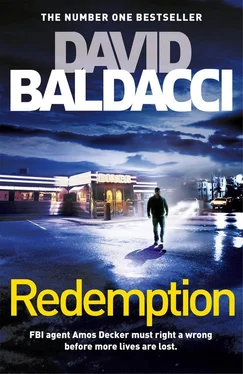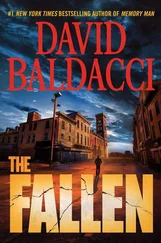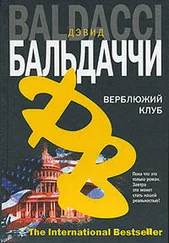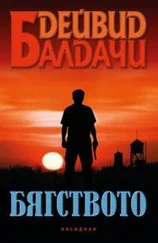“Katz is dead. I don’t see what harm there is in looking at old bank records.”
“I guess that’s true.” Tinsdale tapped some keys and maneuvered through some screens. “Okay, what exactly do you want to know?”
“How much was the loan for?” asked Decker.
Tinsdale read off the screen. “Two point five million.”
Lancaster gaped. “That’s a pretty big loan, isn’t it?”
“Well, I’ve done bigger. But it is fairly substantial for a restaurant in Burlington, I’ll grant you that, particularly since it was so many years ago. But it was apparently an expensive buildout.”
“Have you been to the Grill?” asked Decker.
“I have in fact, yes.”
“It seemed like a million other restaurants I’ve been in. Not particularly high-end.”
Tinsdale was nodding before he finished speaking. “I have to admit that I thought the same thing, actually. But the loan was granted.”
“Did he have to put up any collateral for the loan?”
“Well, we put a mortgage on the property, of course, and the improvements. That’s standard. And, yes, I would imagine he had to put up some money of his own. We don’t generally fully fund projects like this. We want the borrower to have some skin in the game, so to speak. He was applying for money for the construction and also operating funds to get the business up and going. It’s not like he could start paying down the loan from day one while they’re still building the thing. The interest would be wrapped into the principal and payments calculated off that. Let me just check on a few items.” He read down several more screens. “Okay, yes, he did put up some money of his own. A little over five hundred thousand. That went into the land purchase. And he also personally guaranteed the loan.”
“Is that typical?” asked Lancaster.
Tinsdale gave her a knowing look. “Oh, yes. Especially with a restaurant. Failure rates on those are really high. And if the customer defaults, the bank doesn’t just want to have to look to the collateral. We’re not in the business of running a restaurant. And the resale rates on a failed restaurant operation are not very good. Pennies on the dollar. People figure if a location failed, why would a second try succeed?”
“So, if he personally guaranteed the loan, he must have had some wealth,” said Lancaster.
“Assuredly yes. We would have done a complete financial due diligence on him. And he would have had to show proof of collateral funds and we would have filed a security interest on those assets. Stocks or bonds or cash accounts or whatever the collateral was, giving the bank a secured interest in those assets in case of default.”
“Could you tell us what his net worth was back then?” asked Decker.
Tinsdale hit some more keys. “Let’s see. Okay, we took an interest in some CDs that he had that were worth eighty percent of the loan amount. All told, it shows that his net worth back then was about nine million dollars.”
“Wow,” said Lancaster. “With all that money, why not just fund the construction out of his own pocket?”
Tinsdale smiled knowingly. “First rule of business, when you can, use someone else’s money.”
“Right.”
“What was the main source of his wealth?” asked Decker.
“Seemed to be stocks and bonds mostly. Couple of annuities. It was all liquid.”
“But does it show where his wealth initially came from?”
“No, it doesn’t. But all the assets were legally in his name.”
“And he was the only borrower?”
“Yes, he wasn’t married when he did this deal.”
“And Don Richards did everything by the book?” asked Lancaster.
“Absolutely. All done in accordance with the bank’s loan requirements.”
“What was Katz’s background? Education? Birthplace? History?”
Tinsdale looked over the screens. “Says here on his loan app that he had a BA and an MBA. He listed his occupation as entrepreneur.”
“But again, no source for his wealth other than the net worth figure?”
“Well, it was his money. That was verified. He might have inherited it.”
“I assumed when he died that the loan rolled over to his widow?”
“No, it didn’t.”
“Why not?”
“It was a construction loan that was rolled into a five-year loan with a fixed interest rate. But Katz paid the whole thing off about six months after the restaurant opened.”
“How did he do that?” asked Decker.
Tinsdale studied the screens once more. “It’s not entirely clear, but it seems like he raised some private money from investors and used that to pay off the loan completely.”
“And did he take out any more loans with the bank?”
“There were two lines of credit for a million each that he took out around the same time. He fully drew down on both and then paid them off. Then he bought an old factory building for about three million with an eye to turning it into retail and living space. He took out a loan for that too. It was finished after he died.”
“Is the loan still outstanding on that one?”
Tinsdale moved through some more screens. “No. Katz paid that one off too.”
“When?”
“Let me see. It says here it was paid in full one year after he took it out.”
“But you said the building was finished after he died,” said Decker.
“That’s right. They were only about halfway done when he was killed.” Tinsdale shrugged. “Apparently he had another round of investment money come in and they took the loan out.”
“And did Don Richards work on all these deals?”
“That’s right. He was sort of Katz’s go-to person.”
“Has Rachel Katz applied for any loans from the bank?”
“No. She doesn’t even have a personal account with us. I think she has some deep pockets behind her. Doesn’t need a commercial lending source anymore. She seems to be rolling in money right now.”
“Nice job if you can get it,” said Lancaster dryly.
Outside, Decker looked to the sky. “We were led to believe that the only deal Katz and Richards worked on was for the American Grill. But that wasn’t the case. There were the lines of credit and the old factory building.”
“Okay, but what did we get out of all that except that some people have all the friggin’ luck, and all the money?” asked Lancaster.
“When somebody keeps paying off big loans unusually early because they got ‘investment money’ rolling in from shell companies, it tells me one thing.” He looked at his partner.
Lancaster nodded. “David Katz was cleaning money.”
“Exactly. And I wonder if Rachel Katz took over the laundry business when he died.”
Decker and Lancaster were seated across from Bill Peyton in his small office at the American Grill. Peyton was a big man, about six-two, two-twenty, with thick shoulders and muscular arms. His gray hair was cut in a bristly flattop turning silver at the temples. In his early sixties now, he looked like he could bench-press a truck.
“Thanks for meeting with us,” said Lancaster.
“No problem. How is Ms. Katz doing?”
“She hasn’t regained consciousness,” said Lancaster. “But the doctors are still hopeful.”
Decker slid a photo out of a slip of plastic and handed it across to Peyton. “Do you recognize this man?”
Peyton fingered the photo. “No, who is he?”
“The man who attempted to murder your boss. He was killed during the encounter. His name is Eric Tyson. Former military.”
“No, never seen him before, certainly not here. I can ask around to the staff and see. But the fact is, Ms. Katz didn’t come here much.”
“But she still owns the place,” pointed out Lancaster.
Читать дальше












